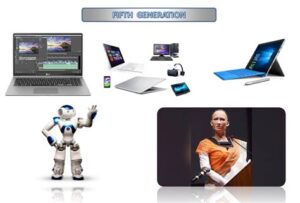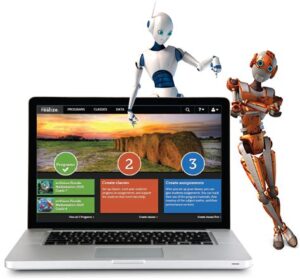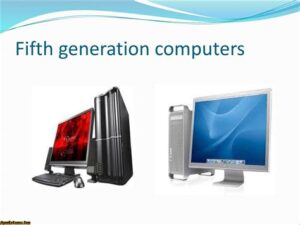Back to: Computer Studies JSS1
Welcome to class!
In today’s class, we shall be talking about the fifth generation of computers. Please enjoy the class!
Fifth Generation of Computers
The realm of computing has undergone a remarkable transformation over the decades, marked by distinct generations of computers that have revolutionized the way we interact with technology. While the first four generations focused on advancements in hardware and software, the fifth generation of computers ushered in a new era of artificial intelligence (AI), paving the way for machines that can mimic human cognition.

Fifth-generation computers, also known as modern computers, are characterized by their ability to process information in a more human-like manner. This is achieved through the integration of AI technologies, including:
Expert systems: These systems emulate the expertise of human professionals in specific domains, providing solutions to complex problems.
Natural language understanding (NLU): Computers can now comprehend human language, enabling natural interactions and enhanced communication.
Image recognition: Machines can analyze and interpret visual data, identifying objects and patterns within images.
Neural networks: Inspired by the structure of the human brain, neural networks are capable of learning and adapting to new information, enabling continuous improvement.
Key Technologies of Fifth Generation Computers

The realization of fifth-generation computers relies on several key technologies, which includes:
Parallel processing: Distributing computational tasks among multiple processors simultaneously to achieve faster execution.
VLSI (Very Large Scale Integration): Miniaturizing electronic components onto a single chip, enabling the creation of powerful and compact devices.
Knowledge bases: They can store and organize vast amounts of information in a structured format, providing a foundation for AI applications.
Applications of Fifth Generation Computers

The advent of fifth-generation computers has opened up a wide range of applications, including:
Medical diagnosis: AI algorithms can analyze patient data and medical images to assist in diagnosis and treatment planning.
Financial trading: Predictive analytics and machine learning can identify market trends and inform investment decisions.
Autonomous vehicles: Self-driving cars rely on advanced AI systems to navigate roads and make real-time decisions.
Virtual assistants: AI-powered virtual assistants like Siri and Alexa provide personalized assistance and respond to natural language commands.
Language translation: AI systems can translate text and speech between different languages, breaking down communication barriers.
Impact of Fifth Generation Computers
Fifth-generation computers have had a profound impact on society, transforming industries and shaping the way we live, work, and interact with technology. Some of the impact include;
Enhanced productivity: AI-powered tools and applications have streamlined processes and increased efficiency across various industries.
Improved decision-making: Data-driven insights and predictive analytics enable informed decision-making in various domains.
Personalized experiences: AI algorithms can tailor recommendations, services, and content to individual preferences.
Innovation and discovery: AI is driving innovation in fields like scientific research and drug discovery.
Fifth-generation computers have marked a significant milestone in the evolution of computing, introducing artificial intelligence as a transformative force. With continued development and responsible implementation, AI holds immense potential to enhance our lives, solve global challenges, and shape the future of technology.
We have come to the end of today’s class. I hope you enjoyed the class!
In the next class, we shall be discussing Data Processing.
In case you require further assistance or have any questions, feel free to ask in the comment section below, and trust us to respond as soon as possible. Cheers!
Question Time:
- What are the defining characteristics of fifth-generation computers that distinguish them from previous generations?
- How does the integration of artificial intelligence (AI) into fifth-generation computers fundamentally change the way we interact with technology?
- Explain the role of parallel processing, VLSI (Very Large Scale Integration), and knowledge bases in enabling the capabilities of fifth-generation computers.
- Discuss the ethical considerations and challenges associated with the development and deployment of fifth-generation computers.
- What are the potential societal impacts of fifth-generation computers, including both positive and negative consequences?
